Long-term treatment with lingonberry (Vaccinium vitis-idaea) juice lowered the already elevated blood pressure and improved the function of blood vessels in an experimental rat model of hypertension.

Lingonberry (Vaccinium vitis-idaea) possesses anti-inflammatory properties, which may well contribute to its ability to reduce blood pressure and improve vascular function. Image credit: Jonas Bergsten.
“Consumption of polyphenol-rich foods, such as berries, fruits, tea and cocoa has been claimed to exert beneficial effects on cardiovascular health,” said Anne Kivimäki, a researcher in the Department of Pharmacology at the University of Helsinki.
“Wild Nordic berries, e.g. lingonberry, bilberry, cranberry and cultivated blackcurrant are good sources of polyphenols including flavonoids, such as anthocyanidins, proanthocyanidins and flavonols.”
“The aim of our studies was to investigate the effects of cranberry, lingonberry and blackcurrant juices on vascular function of genetically hypertensive rats and to clarify how lingonberry affects the blood pressure of spontaneously hypertensive rats and normotensive rats consuming a high-salt diet.”
“We also wanted to determine whether lingonberry juice could exert effects on low-grade inflammation, a phenomenon, which has been related to hypertension and excess salt intake.”
Kivimäki investigated the cardiovascular effects of cold-pressed lingonberry juice, cranberry juice and blackcurrant juice as drinking fluid for 8-10 weeks on genetically hypertensive rats.
Diluted lingonberry juice significantly lowered high blood pressure in the animals, while juice that contained more polyphenols improved impaired blood vessel function to the level of healthy vessels.
The juice did not prevent the age-related elevation of blood pressure typical to the hypertensive animal strain.
Lingonberry juice also prevented the expression of genes associated with low-grade inflammation in the aorta. The effect of other berry juices was less marked.
“Underlying the effect is probably the reduction of low-grade inflammation as well as mechanisms related to the renin-angiotensin system, a central regulator of blood pressure, and the availability of nitric oxide, a local endothelial vasodilating factor,” Kivimäki said.
“These experimental findings need evidence from comparative clinical studies on healthy individuals with slightly elevated blood pressure who, at this point, have been given nutritional and lifestyle guidance instead of drug therapy.”
“Lingonberry juice is no substitute for medication, but it is a good dietary supplement.”
_____
Anne Kivimäki. 2019. Lingonberry juice, blood pressure, vascular function and inflammatory markers in experimental hypertension. University of Helsinki, Finland







